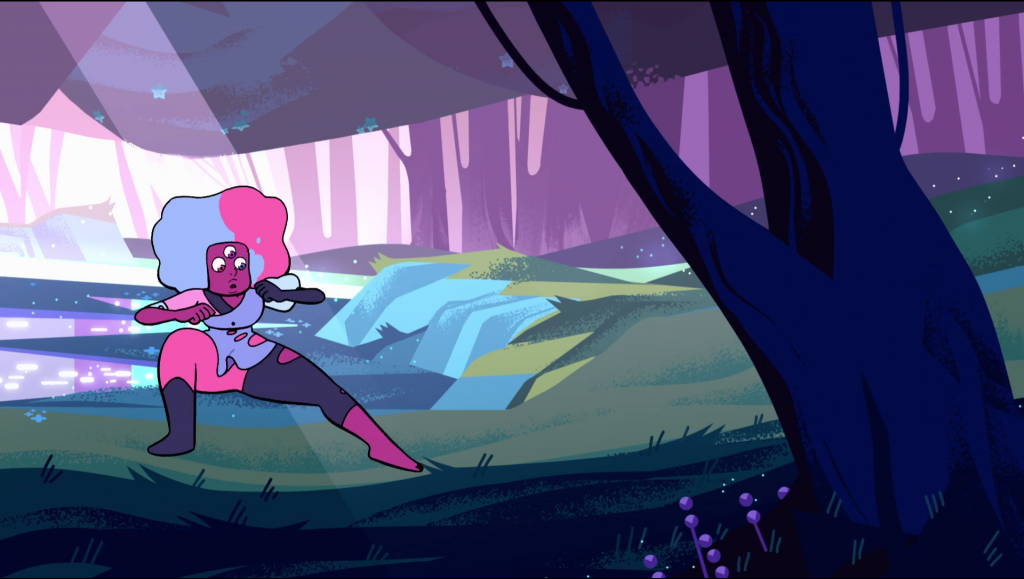
Out of curiosity, I googled it to see what other (re)viewers thought. In doing so, I found this utterly bizarre AV Club article, which states that the episode “doesn’t really tell us anything we couldn’t have guessed, or anything that we really needed to know” and “feels like a nice little present to the fans.” The song, “Something Entirely New,” is about “normal relationship things (Ruby says Sapphire is different, she swears, and Sapphire has never fused before, she promises),” which is “deeply color-by-numbers for this kind of love story, but it’s still deeply earnest.” It’s “a standard ‘getting to know you’ montage.”
I hate to be snarky, but to be totally honest, this is what happens when you let straight people write reviews.
What “standard ‘getting to know you’ montage” is about two femme-of-center people abandoning their entire species and planet in order to be together, despite being threatened with death for it? How many fluffy romcoms have you seen where the couple doesn’t even realize that it’s physically or psychologically possible for them to be together, because they have been raised to consider it unthinkable?
(That’s not even getting into the fact that the show’s depiction of gem fusion is heavily based on consent, which is a concept apparently missing from most romcom filmmakers’ vocabularies.)
If you’re queer, on the other hand–especially if you’re a queer woman or nonbinary person–Ruby and Sapphire’s love story probably felt very familiar to you, but not from the media.
As queer representation in film and television is finally expanding (albeit glacially), there are still very few depictions that feel true to what our experience is actually like. Sure, sometimes there’s the religious homophobic parent or the bullying classmates or the angst about coming out, for whatever that’s worth. Usually it’s just two people falling randomly into bed together without any exploration of how they might’ve gotten there.
What “The Answer” does incredibly well is that it portrays that “unthinkableness” of it, really makes that come alive. It’s something I wrote about recently in my piece on Medium, “What It Feels Like for a Queer Girl“:
It doesn’t matter if the other person is openly queer themselves, even. It’s not just about fear of homophobic backlash or an especially cruel rejection. It’s the pervasive, gnawing, choking feeling that what you want is simply impossible. It feels like trying to make two parallel lines meet. Like climbing all the way to the top of one of M.C. Escher’s dizzying staircases. Every time I’ve expressed desire for another woman — and don’t misunderstand, there have been plenty of times, despite it all — I’ve felt like laughing at myself. Not funny ha-ha, but ridiculous ha-ha, like what the fuck am I doing ha-ha.
To me, being queer is living with this kind of cognitive dissonance forever — that something feels so natural to me, and yet I am convinced of its impossibility, and that conviction is firmer than almost anything else I believe.
With Garnet’s story, Steven Universe uses an allegory to show how difficult it can be to start imagining these new possibilities when you’ve never been allowed to. On the gems’ Homeworld, fusion is only for two or more gems of the same type (and only for a specific, time-limited purpose, like a battle). The first time Ruby and Sapphire fuse, it’s an accident–they didn’t even think that it was possible. They didn’t even think to wonder if it was possible. But as it turns out, it is, and they realize that they like it.
The song that AV Club calls “color-by-numbers” is actually a subtle exploration of that experience.
Where did we go?
What did we do?
I think it was something
Entirely newAnd it wasn’t quite me
And it wasn’t quite you
I think it was someone
Entirely new
Trust me, the average hetero couple hooking up in your standard romcom knows exactly what they did.
Ruby: Oh, um, well–I just can’t stop thinking–
Sapphire: So, um, did you say I was different?
Ruby: –and you hadn’t before?
Sapphire: Of course not! When would I have ever?
Ruby: I’m so sorry–
Sapphire: No, no, don’t be!
Ruby: –and now you’re here forever!
Sapphire: What about you?
Ruby: What about me?
Sapphire: Well, you’re here too. We’re here together.
This isn’t about “I’m your first, right?” This is about two people trying to figure out what just happened and why it felt so different from anything they’ve ever experienced. Sapphire is “different” for Ruby because Ruby only ever got to fuse with other rubies. And she “hasn’t before” because sapphires don’t get to fuse at all. On Homeworld, everyone has their role, and they don’t step out of it–until now.

(Later, we find out what happens to Homeworld gems who “came out wrong” or who want to live in fusions–they hide away underground, under threat of capture and shattering.)
So unthinkable is Ruby and Sapphire’s fusion that Sapphire–who can see the future, and up until that moment saw her entire life laid out before her–literally didn’t see this coming. And when it does, it changes everything, costing Ruby and Sapphire their social positions, their home, their friends, their ideologies, and very nearly their lives.
Pretty relatable for anyone who’s ever come out and been rejected.
(Luckily for Sapphire and the lives of everyone she loves, her future vision eventually returns.)
I’m not surprised that lots of folks apparently missed the queer nuances of this 12-minute bit of children’s television, and I’m amazed at what it somehow managed to emcompass in those 12 minutes. I hope that it’s made a lot of other queer folks feel validated, and I hope that my perspective on it helps make our experiences more real to those who don’t share them.

Brute Reason does not host comments–here’s why.
If you liked this post, please consider supporting me on Patreon!



